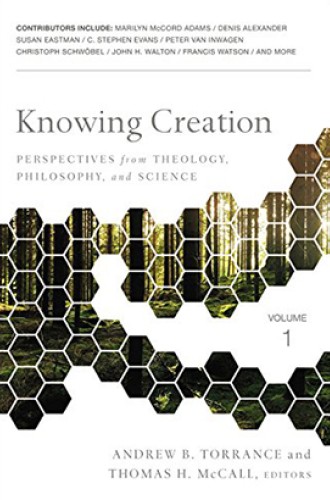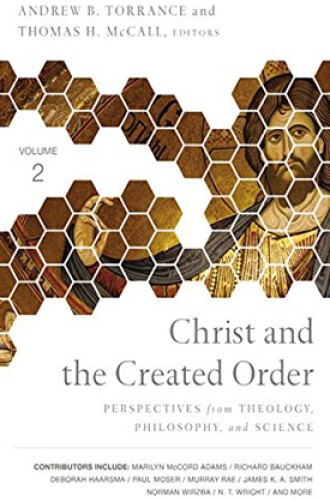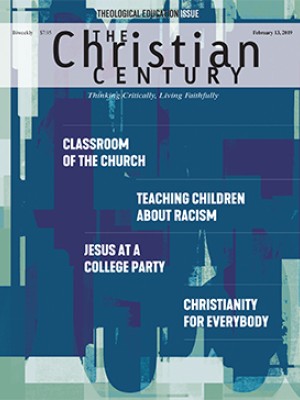Crossing the boundary between theology and science
Essays that consider the natural order as God's creation—in a way scientists might recognize.
If (like me) you’ve thought that much of the writing on creation care and environmental stewardship was theologically thin, and if (like me) it’s bothered you that many Christians writing about the created world appear to feel it necessary to jettison their religious convictions in order to be permitted to have a conversation with real scientists, you need to read these two books. Each volume brings together leading Christian theologians, biblical scholars, philosophers, and scientists to offer a sustained, complex, and quite wonderful conversation about God, science, and the created realm.
The editors assume that “there should be nothing about a Christian theology of creation that necessitates competition with the mainstream consensus of modern science.” They serve notice that they have collected essays that “are not simply informed by empirical science but also by metaphysical assumptions about the nature of things.” Refusing to succumb to Stephen Jay Gould’s rule that science deals with the realm of “hard facts” while theology is concerned with “values and meaning,” all of the essayists attempt to think about the natural order as creation, but in a way that scientists—if they are willing to consider the possibility that theological thought is indeed thinking—will recognize as science.
Read our latest issue or browse back issues.
What unites all of these writers is the deft ability to overcome the academic pressure to stay confined within the boundaries of their field. No naive apologetic, here is theology eager and willing to do the homework required to be a worthy conversation partner with science. Here also is science willing to risk metaphysics. Engaging Job, Moses, Luther, Calvin, Derrida, and Dawkins (who doesn’t come out well at all), these essays make me proud to be part of the Christian tradition that has no reason to cower before the claims of science.
In the first volume, Knowing Creation, Denis Alexander gives complexity to our thinking about both creation and evolution. Randall Zachman makes a provocative case that, for Calvin, every Christian should try to be a scientist—that is, someone who longs for the deepest possible understanding of creation. John Walton and Francis Watson’s chapters do a great job of helping us—in our era of modern science—to read Genesis in a way that is appropriate to the text. In Susan Eastman’s fascinating chapter on Paul’s epistemology and creation, some wonderful insights emerge through the biblical scholar’s engagement with neuroscience and psychology.
Marilyn McCord Adams contributes an invigorating defense of creation as trinitarian all the way down. As a preacher, I loved Christoph Schwöbel’s chapter, “We Are All God’s Vocabulary,” which (with help from Luther) speaks of creation as the result of trinitarian self-communication. Andrew B. Torrance boldly offers scientists some theologically derived guidelines for engaging the natural world as creation. Every essay shows how intellectually productive (rather than merely contentious) the classical claims of Christian faith can be when coupled with informed scientific investigation.
Christ and the Created Order, the second volume, opens with the admission that “in conversations about science and faith, Jesus Christ rarely comes up.” Yet I can’t imagine how any intellectual, after reading the essays in this volume, could discuss either faith or science without reference to Jesus Christ. Christ is fully creator and fully creation without separation or confusion. Christ is the triune God actively and decisively engaging with creation. “While knowing Christ may not make any practical difference to the natural scientist,” the editors write, “it makes all the difference to her perception of the cosmic field in which she operates.”
Many of the essays in this volume are addressed to Christian scientists. I hope that such scientists will read the book—not only because they’ll be more informed Christians but because they’ll be better scientists. Murray Rae builds upon Paul’s claim that Christ is the one who created the universe, and Norman Wirzba shows the fruitfulness of thinking about creation and providence christologically. N. T. Wright goes head-to-head with the limp deism that has characterized many Christians’ reaction to evolution. If you really want to know creation, he argues, you don’t have to jettison Christ in favor of bland natural theology.
In a chapter that she completed shortly before her death, Marilyn McCord Adams preaches the gospel by arguing that all creation is made for the sake of Christ. All that’s material exists out of divine love and all materiality exists to be loved by Christ. James K. A. Smith comes in with the christological tour de force, a Chalcedonian argument that posits Christ’s two natures as the only way to understand the world we’ve been given. Ruth Bancewicz’s essay wraps up the volume with a doxological invitation for science to wonder and to worship, a fitting conclusion to the christological hymn that is Christ and the Created Order.
I finished these volumes not only full of elation for having made it through some deep, thick theology in conversation with some demanding scientific theory—I’ve never recovered from that B I got in high school chemistry class—but also with thanksgiving for the gift that is classical Christology. No one who cares about the future of Christian theology or the possibility of mutually edifying conversation between Christianity and science can afford to ignore these excellent books.
A version of this article appears in the print edition under the title “Christian science.”







